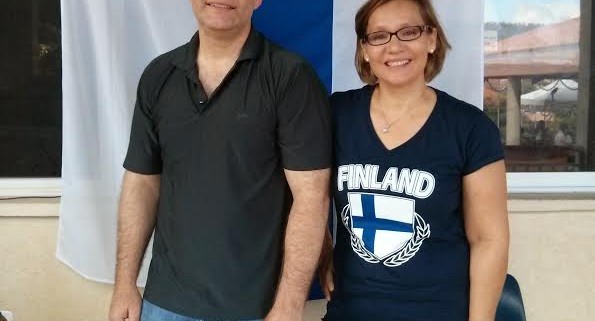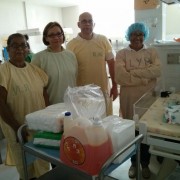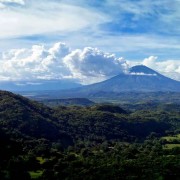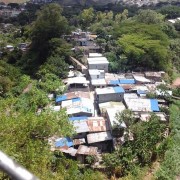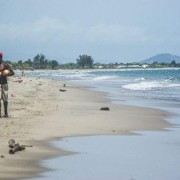Seija Staples – Living in Honduras Is An Interesting Experience
Recently I saw a discussion Seija Staples was having with someone at Facebook and realized she lives in Honduras. One of my friends is partly Hondurian which made me contact her and ask for an interview.
Seija’s husband is an American diplomate. Most diplomates change countries every 2-4 years depending on the country and position – and in many ways it can be a great lifestyle (or a very difficult lifestyle depending on your personality).
Hi Seija. Can you tell us a little about yourself?
I was born and raised in Hyvinkaa, Finland. I always loved to learn languages, and was interested in foreign countries and cultures. My family never traveled much, but I was always interested in other countries and cultures, and loved learning foreign languages.
In high school I spent the summer after my junior year working in Germany – and my interest level went up even more.
After high school I decided to spend my summer in the USA doing sightseeing and exploring. The following year I applied to Brigham Young University. While at BUY I met my husband, got married and ended staying in the USA
Where all have you lived abroad?
I have lived in Utah and Washington State, and Washington DC (USA); Poland and now Honduras.
Honduras is considered very dangerous…how does that affect you?
Honduras has the highest murder rate in the world. It is a challenging place to raise a family, as security is a constantly on your mind. We don’t walk anywhere, and riding a bike is out of question. Instead of normal fenced yard, we live behind cement walls and double razor wire. Our car has tinted windows, so that people can’t see inside. The schools our kids go to have armed guards at all entrances, who check who is coming and going. Our neighborhood is gated, with guards (who are supposed to check everyone who comes in), and we also have security guards patrolling by our house and checking that everything looks normal, 24/7.
Our house is alarmed, and we have a camera to see who is ringing the doorbell, and if it isn’t someone we know, or not previously arranged, we don’t open the door. Honduras is a beautiful country with amazing nature, culture and history–so much to offer to locals and tourists alike, but being so unsafe, it makes is a challenge to enjoy it all. That said, we have traveled around the country, and outside the capital, it is safer, although I also traveled to San Pedro Sula which is the actual murder capital of the world, and I was fine. I don’t go out at night, and I never walk outside after dark.
What’s the most difficult part about living abroad? What’s the best part?
The most difficult part of living abroad, for me, is being away from family. Our family is now spread around all over. I have family in Finland, and now grown children and grandchildren in Arizona, Utah and Alaska, so it has to to do with missing major events, birthdays, holidays; and also not being there to support when difficult situations arise–illness, aging parents, for example. The kids we have at home (ages 11, 13, 16) have a hard time changing schools and making new friends every few years. At the same time, they are very good at adapting to new places and situations, and every time we move, they miss the friends they made there.
The best part of living abroad to me is experiencing new cultures and customs; seeing new places, tasting new foods, meeting new people. I also love learning new languages. I get “itchy feet” after a while of living in one place– with my hustand’s job, we change countries every two to three years, so this has definitely taken care of that.
What have you learned from living abroad?
It has made me appreciate how good we have it at “home”. Being able to walk safely around in public areas, being able to drink tap water, having everything easily available (for example, familiar foods, and the fact that they are clean and safe).
You learn a lot about yourself and your family– when you first arrive to your new country, that is all you have (your spouse and kids) and you learn to rely on each other, and you also learn what is not working in the relationship, as you haven’t made new friends yet, don’t have a routine yet, so your immediate family is all you have.
What is your secret to keeping a positive attitude while living abroad?
Don’t stay at home! Explore your new country, accept invitations, try your language skills, try new foods. In our situation, as we move every few years, we learn to make friends quickly, as we will move soon again, or the friends may move soon, so you don’t take a long time getting to know people, you will enjoy that friendship for as long as it lasts.
What´s the best place you´ve ever traveled to?
In Central America, my favorite place that I’ve been to so far, is a small town of El Cuco, El Salvador. Beautiful tropical beaches. We learned to surf and ate freshly caught shrimp cooked right on the beach. When we lived in Poland, we took road trips to the nearby countries(Slovakia, Slovenia, Hungary, Italy–and of course drove to Finland via Lithuania, Latvia, Estonia etc.), –beautiful places.
I don’t think I have one favorite place, but I really like out of the way places, small villages vs. large cities.
Do you have a bucket list? Would you share with us a couple of things on that list?
I don’t really travel for the sake of traveling, as moving to another country is a part of my husband’s job…one of the things I had always wanted to do, but didn’t when I lived in Finland, was going to lavatanssit, so we did that the last time we visited Finland, and had a blast!
There are places I want to see in our current country (Honduras) that I haven’t been to yet but want to go (Copan Ruins, ancient Mayan ruins) and Roatan, a tropical island famous for fantastic diving and swimming with dolphins. When we find out where we will move to in 2016, we will research what there is to do in that country, and those things sort of become our bucket list for that tour
What advice do you have for people who are considering moving abroad, but are feeling doubtful?
I would say, if possible at all, visit the place first that you are considering moving to, before you decide to go live there. Once you move there, you can always go back, so it doesn’t have to be thought of as a permanent decision. Consider the stages of culture shock–most people will adjust after a while, even if it’s hard in the beginning. There will be positives and negatives wherever you live. A real thing to consider is that if you move far away, you will miss many important family events, time with your parents and friends, and those things are important, and, in my experience, become even more so if you have children.
Editor’s note:
Seija and her husband have 7 kids – three of the youngest ones are still at home, she has already 5 grandchildren in the USA. Given what her husband does for work and having 7 kids we can easily guess why she has been a housewife up to now. However, she is an intelligent woman and would like to return to worklife now when she has “only” 3 kids home.
Connect with Seija Staples:
Share this interview with your friends – and let us know if we could interview you via email for our website.
Contact us via email!

